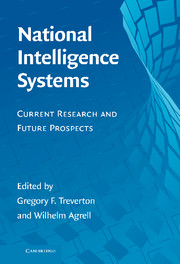Book contents
- Frontmatter
- Contents
- Preface
- 1 Introduction
- PART 1 DEFINING THE FIELD, ITS THEORY, HISTORIOGRAPHY, AND CHANGES AFTER THE COLD WAR
- 2 Building a Theory of Intelligence Systems
- 3 Reflections on Intelligence Historiography since 1939
- 4 A Theory of Intelligence and International Politics
- 5 Intelligence Analysis after the Cold War – New Paradigm or Old Anomalies?
- PART 2 RESEARCH ON NEW CHALLENGES, METHODS, AND THREATS
- PART 3 INTELLIGENCE, POLITICS, AND OVERSIGHT
- Index
- References
5 - Intelligence Analysis after the Cold War – New Paradigm or Old Anomalies?
from PART 1 - DEFINING THE FIELD, ITS THEORY, HISTORIOGRAPHY, AND CHANGES AFTER THE COLD WAR
Published online by Cambridge University Press: 05 June 2012
- Frontmatter
- Contents
- Preface
- 1 Introduction
- PART 1 DEFINING THE FIELD, ITS THEORY, HISTORIOGRAPHY, AND CHANGES AFTER THE COLD WAR
- 2 Building a Theory of Intelligence Systems
- 3 Reflections on Intelligence Historiography since 1939
- 4 A Theory of Intelligence and International Politics
- 5 Intelligence Analysis after the Cold War – New Paradigm or Old Anomalies?
- PART 2 RESEARCH ON NEW CHALLENGES, METHODS, AND THREATS
- PART 3 INTELLIGENCE, POLITICS, AND OVERSIGHT
- Index
- References
Summary
Intelligence organisations, in their modern 20th-century form, are not only providers of information acquired through what is traditionally described as special means. Intelligence organisations or communities are also increasingly expected to achieve some sort of comprehension of a general situation and the course of specific events. In the best of worlds, this comprehension can be transformed into useful background analysis or warning – whether early or late, specific or general – that something is or might be developing in the domain that the intelligence service is expected to monitor. In the real world, lack of comprehension and, thus, of foresight is a common phenomenon, so common that it now constitutes the dominating theme of intelligence studies. Remove the failures and little is left of what is written about intelligence analysis and its use during the Cold War and beyond. Huge efforts have thus been expended to investigate and ponder why intelligence has been unable to deliver what was rightfully or wrongfully expected from it and to find solutions in terms of intelligence reform, often focused on reorganisation. This failure–investigation–reorganisation cycle has become something of a malaise of early 21st-century Western intelligence.
A consensus has emerged on the necessity to transform intelligence and improve its ability to analyse and deliver foresight. However, neither reorganisation nor analytic training is a sufficient answer. The fundamental problem is the implicit model for knowledge production in intelligence systems that have been in place for more than a half-century.
- Type
- Chapter
- Information
- National Intelligence SystemsCurrent Research and Future Prospects, pp. 93 - 114Publisher: Cambridge University PressPrint publication year: 2009
References
- 3
- Cited by



